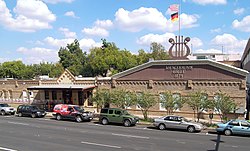
The Coors Brewing Company is an American brewery and beer company based in Golden, Colorado that was founded in 1873. In 2005, Adolph Coors Company, the holding company that owned Coors Brewing, merged with Molson, Inc. to become Molson Coors. The first Coors brewery location in Golden, Colorado is the largest single brewing facility operating in the world.

German Americans are Americans who have full or partial German ancestry. The 2020 census results showed over 44,978,546 Americans self-identifying as German alone or in combination with another ancestry. This includes 15,447,670 who chose German alone.
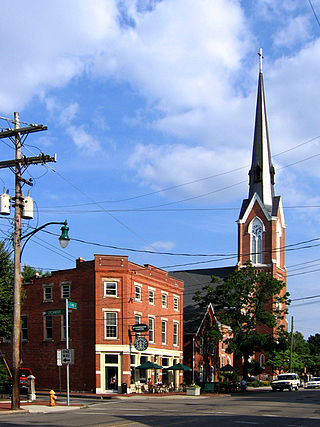
German Village is a historic neighborhood in Columbus, Ohio, just south of the city's downtown. It was settled in the early-to-mid-19th century by a large number of German immigrants, who at one time comprised as much as a third of the city's entire population. It became a city historic district in 1960 and was added to the National Register of Historic Places in 1974, becoming the list's largest privately funded preservation district, and in 2007, was made a Preserve America Community by the federal government. In 1980, its boundaries increased, and today it is one of the world's premier historic restorations.
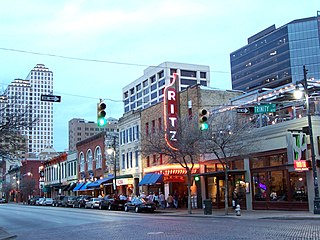
Austin's official motto is the "Live Music Capital of the World" due to the high volume of live music venues in the city. Austin is known internationally for the South by Southwest (SXSW) and the Austin City Limits (ACL) Music Festivals which feature eclectic international lineups. The greatest concentrations of music venues in Austin are around 6th Street, Central East Austin, the Red River Cultural District, the Warehouse District, the University of Texas, South Congress, and South Lamar.

Adolphus Busch was the German-born co-founder of Anheuser-Busch with his father-in-law, Eberhard Anheuser. He introduced numerous innovations, building the success of the company in the late 19th and early 20th centuries. He became a philanthropist, using some of his wealth for education and humanitarian needs. His great-great-grandson, August Busch IV, is a former CEO of Anheuser-Busch.

Castle Clinton is a restored circular sandstone fort within Battery Park at the southern end of Manhattan in New York City. Built from 1808 to 1811, it was the first American immigration station, predating Ellis Island. More than 7.5 million people arrived in the United States at Fort Clinton between 1855 and 1890. Over its active life, it has also functioned as a beer garden, exhibition hall, theater, and public aquarium. The structure is a New York City designated landmark and a United States national monument, and it is listed on the National Register of Historic Places.

The Pabst Brewing Company is an American company that dates its origins to a brewing company founded in 1844 by Jacob Best and was, by 1889, named after Frederick Pabst. It is currently a holding company which contracts the brewing of over two dozen brands of beer and malt liquor: these include its own flagship Pabst Blue Ribbon, as well as brands from many now-defunct breweries.

Spoetzl Brewery is a brewery located in Shiner, Texas, United States. It produces a diverse line of Shiner beers, including their flagship Shiner Bock, a dark lager that is now distributed throughout the US. The brewery is owned by the Gambrinus Company, a family-owned company based in San Antonio, which also owns Trumer Brewery in Berkeley, California.

Wave Hill is a 28-acre (11 ha) estate in the Hudson Hill section of Riverdale in the Bronx, New York City. Wave Hill currently consists of public horticultural gardens and a cultural center, all situated on the slopes overlooking the Hudson River, with expansive views across the river to the New Jersey Palisades. The estate includes two houses and a botanical garden. The oldest part of the main house, Wave Hill House, dates to 1843; Glyndor House dates from 1927 and contains a multi-room art gallery. Perkins Visitor Center, which was originally a garage, contains a gift shop and an information desk.
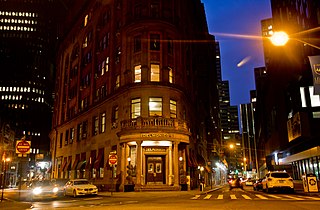
Delmonico's is the name of a series of restaurants that operated in New York City, and Greenwich, Connecticut with the present version located at 56 Beaver Street in the Financial District of Manhattan. The original version was widely recognized as the America's first fine dining restaurant. Beginning as a small cafe and pastry shop in 1827 at 23 William Street, Delmonico's eventually grew into a hospitality empire that encompassed several luxury restaurants catering to titans of industry, the political elite and cultural luminaries. In many respects, Delmonico's represented the genesis of American fine dining cuisine, pioneering numerous restaurant innovations, developing iconic American dishes, and setting a standard for dining excellence. Delmonico's shuttered all locations by 1923. In 1926, Delmonico's under new ownership by Italian immigrant Oscar Tucci reopened at 56 Beaver Street.
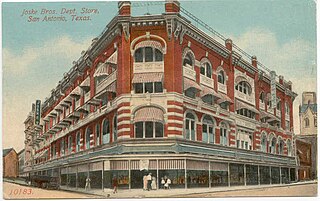
Joske's, founded by German immigrant Julius Joske in 1867, was a department store chain originally based in San Antonio, Texas. In December 1928, Hahn Department Stores acquired the company along with the Titche-Goettinger department store of Dallas, and three years later Hahn became part of Allied Stores. Allied was taken over by Campeau in 1986, and Campeau in turn sold the Joske's chain in 1987 to Dillard's. All Joske's stores were then quickly converted into Dillard's locations.

Monument Hill and Kreische Brewery State Historic Sites are two state historic sites managed by the Texas Historical Commission. They are located at 29.888° -96.876°, just off U.S. Route 77, south of La Grange, Texas. The sites sit on a sandstone bluff 200 feet above the Colorado River. Monument Hill is a memorial to the men who died in the Dawson Massacre and in the Black Bean Episode of the ill-fated Mier Expedition.
Scholz is a German surname. It is the East Central German and Silesian version of the name Schulz, Schultz, Schultheiss.
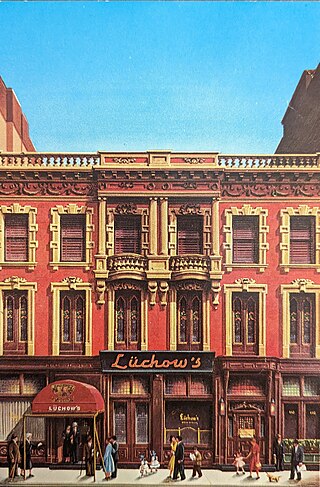
Lüchow's was a restaurant at 110 East 14th Street at Irving Place in East Village in Manhattan, New York City, with the property running clear through the block to 13th Street. It was established in 1882 – at a time when the surrounding neighborhood was primarily residential – when a German immigrant, August Lüchow, purchased the cafe where he worked as a bartender and waiter. Lüchow's remained in operation at this place for a full century, becoming a favorite establishment for people in the entertainment world, helped by its proximity to the Academy of Music, the city's opera house, as well as Steinway Hall and Tammany Hall, where other entertainment was offered.

Swante M. Swenson was the founder of the SMS ranches in West Texas. It was through his efforts that Swedish immigration to Texas was begun in 1848. In 1972, he was inducted into the Hall of Great Westerners of the National Cowboy & Western Heritage Museum.
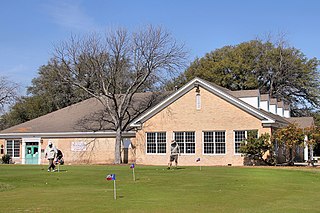
Lions Municipal Golf Course, nicknamed Muny, is a municipal golf course at 2901 Enfield Road in Austin, Texas. The golf course occupies 141 acres of land the City of Austin leases from the University of Texas since 1937 as part of the greater Brackenridge Tract. The golf course has been subject to ongoing controversy due to the recommended termination of the current term by the University of Texas in 2019. A report commissioned by the city found that Muny's burdensome property lease payment is a primary challenge in operating Austin's public golf courses.
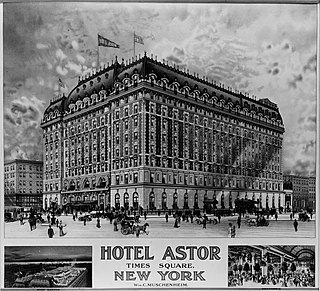
The Eitel Brothers refers to a family of four brothers, Emil, Karl, Robert and Max Eitel, originating from Stuttgart in Germany who, from 1894, were hoteliers and restaurateurs in Chicago, US. They were well known for the luxury hotel Bismarck Hotel and restaurants such as the Marigold Gardens and the Old Heidelberg Inn. Typically excluded is Albert Eitel, who remained in Stuttgart as an architect.

The following is a timeline of the history of the city of San Antonio, Texas, United States.
The following is a timeline of the history of the city of Austin, Texas, USA.
